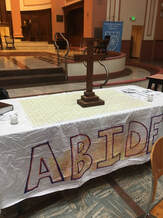 MANNA (Many Angels Needed Now and Always) is a leadership organization working with people who do not have homes. Read more about MANNA in my book Five Loaves, Two Fish, Twelve Volunteers. I recently attended their Monday worship at The Cathedral Church of St. Paul in Boston. The quiet of MANNA's Monday Lunch provided respite for many after a night of protests for Black Lives Matter in Boston. Jennifer McCracken, the priest for this congregation, checked in with me frequently during lunch, but didn't have a minute to spare as one person after another wanted to share their stories with her. She knew, she understood, she was there. She looked tired as worship began. We sat in a large circle, each chair six feet from the next, a couple chairs in the center, also appropriately distanced, and in front of the altar, two more chairs. The hand painted altar cloth was a little lopsided, and all the animals from Noah's ark had been carefully placed, along with Terry Dactyl, the plastic dinosaur, sitting on one arm of the cross. This is a time of pandemic; the Eucharistic elements were missing. As worship progressed our group of six grew to ten or twelve, some sitting in the far corners of the sanctuary. Each person had a backpack or bag at their feet, the hosts at the back entrance offered hot lunch to the latecomers, along with hand sanitizer and masks. Outside the Cathedral's glass doors two more volunteers continued to offer bag lunches to people who didn't want to come inside. Inside was a hushed. People talked, quietly, to others or themselves. The slouched shoulders expressed a sense of rest. The meal had been quiet, but tense, now we began to let out that tension, to share our unrest with God, to let go. The service is familiar and yet specific to the day. “I love this Psalm,” Jennifer hands out a paper. “It's a lament. Today we are going to cry out with all of the pain of the racism, the violence, the pain of last night, and of our lives." Together we read the words of Psalm 13.” “How long, Lord? Will you forget me forever? How long will you hide your face from me? How long must I wrestle with my thoughts and day after day have sorrow in my heart?” We sit a moment in the pain. Jennifer invites a parishioner to create a Gospel Alleluia and he does, mournfully, quietly, it fills the room. His head drops as he finishes. Members of the congregation read the gospel, first in Spanish, then in English. Jennifer calls up a parishioner to preach. He is tall, dark, and devastated. He speaks in spurts, as if God fills him up, he pours it out, and then the next message arrives and gushes onto us. Struggling to hold his body in the chair, clenching his hands in frustration, wiping tears from his face, he preaches confidence God wants something different. As his message dies down Jennifer mentions the scripture we have read and he starts again, more words of God piling on us. Some us look away, I look away, it is so much pain, so much trust, so much power. There is silence. There is peace that passes all understanding. We shuffle in our seats. We wait for the words to flow through us. We wait some more. At lunch one of the volunteers told me to stay for worship. "They do a blessing that is amazing." I had no idea. Jennifer begins by turning to her right, to the preacher, sitting there, and blesses him for his words. She encourages him to bless the woman to his right, and her to bless the man behind her. One by one, the priest naming each person in turn, we each bless the next. Everyone has some little contribution. Everyone is blesses; everyone is blessed. Over the physical distance required by the virus, we pull together in blessing. Over the spiritual distance required by our nation's racial divide, we pull together in blessing. Over the social distance separating people with homes from those without we pull together in blessing. This is church.
2 Comments
You call your ministry “outdoor church” rather than a food service ministry. What is the difference?
The term “outdoor church” literally described the church I pastored for years in Worcester, Massachusetts. We didn’t have a building. But more generally it describes the coming together of people you usually find inside a church with people who live outdoors, the homeless and food insecure. In Worcester, on Sundays we “indoor church” people provided a meal, a Bible study, and a worship service outside. We also held other programs outside during the week. In that church, our program developed to where those who need food became the volunteers for the pantry and meals. In the model I describe in the book, people get to know those who need food by serving and eating with them and invite them into leadership of their programs. Click here for the rest of my interview on the Collegeville website. Upper Room Books has done a series of videos on how people find hope in this time of coronavirus. Honestly at first I didn't find hope. But the my congregation rose up to do great work at our Food Pantry. I find God in the people who do this work, and the people who donate, and the people who come to get food. Here is the video that I offered to Upper Room: Link.
|
My ThoughtsFor my organized thoughts, see my book Five Loaves, Two Fish, Twelve Volunteers: Developing Relational Food Ministries. In this spot are thoughts that appear for a moment--about food programs, mission, church, building community, writing, and whatever else pops into my head. History
January 2024
Categories
All
|
 RSS Feed
RSS Feed